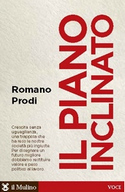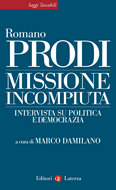Italia e Cina devono continuare ed aumentare il loro impegno per la pace e lo sviluppo nel Mondo
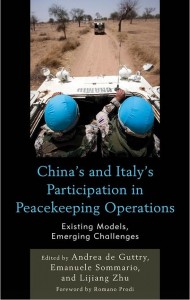 Prefazione di Romano Prodi al libro di Andrea de Guttry, Emanuele Sommario e Lijiang Zhu “China’s and Italy’s Participation in Peacekeeping Operations – Existing Models, Emerging Challenges” (Ed. Lexington Books, Inglese, 120$)
Prefazione di Romano Prodi al libro di Andrea de Guttry, Emanuele Sommario e Lijiang Zhu “China’s and Italy’s Participation in Peacekeeping Operations – Existing Models, Emerging Challenges” (Ed. Lexington Books, Inglese, 120$)
Political instability and war are still endemic in many parts of the world. From West Africa to Afghanistan and from Syria to the Great Lakes, armed conflicts endanger the life of millions of people. Most of these conflicts are intrastate wars that originate from a failure in state building and in economic development. In particular, the weakness of political authority has made some states exposed to criminal trafficking, to the proliferation of weapons, and to a general climate of anarchy. Additional sources of conflict have emerged from the increasing number of religious tensions all over Africa, the Middle East and Asia, which are often exploited by terrorist organizations and sectarian groups.
Concerning Africa and the Middle East, we need to admit that the hopes raised by the Arab Spring have not been fulfilled yet. Instability is affecting numerous countries and open conflict in the Sahel region and in Syria is a matter of great concern not only for regional security, but for international stability. Furthermore, the civil war in Libya created new threats for West Africa and the Sahel, especially in Mali and in its neighbours. The flood of thousands of refugees and the entry of a high number of arms from Libya have aggravated the situation.
Ever since World War II, the costs of instability and war are mainly paid by defenseless civilians that die during military fighting and by other millions of refugees that are condemned to abandon their home and live in conditions far more deadly than the conflict itself. In such a context, it is likely that the need for intervention and peacekeeping will increase in the future. Indeed peacekeeping missions have undergone an exponential increase since the end of the Cold War. They have had their successes and their failures but few would contend that peacekeeping operations have not made a positive contribution to international stability and human security.
Focusing on the Chinese and Italian ‘ways’ of peacekeeping, this book provides a picture of the strengths and weaknesses of contemporary peace operations of two states deeply involved in the management of security at global level. In doing so, the important analyses of this volume describe what has been done and, especially, what should be done in the future when deploying peacekeepers in conflict areas.
Clearly, the analysis of Chinese and Italian peacekeeping is a valuable instrument to assess the entire process of peacekeping and its possible future evolutions.
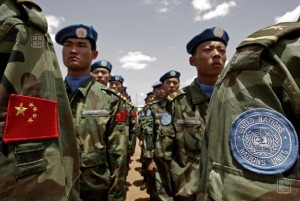 Chinese peacekeeping has undergone an important evolution. From a total refusal to participate in UN peace operations – consistent with Maoist China’s philosophy not to interfere in the domestic affairs of other nations, after the end of the Cold War Beijing has become the major troop contributor among the permanent members of the Security Council.
Chinese peacekeeping has undergone an important evolution. From a total refusal to participate in UN peace operations – consistent with Maoist China’s philosophy not to interfere in the domestic affairs of other nations, after the end of the Cold War Beijing has become the major troop contributor among the permanent members of the Security Council.
In 1988, after the United Nations Peacekeeping Forces were awarded with the Nobel Peace Prize, China joined the Special Committee for Peacekeeping Operations. Four years later, in 1992, Beijing joined for the first time a UN peace operation by dispatching an engineering corps of the People’s Liberation Army (PLA) to Cambodia. From then onwards, China has deployed about 20,000 peacekeepers in different regions of the world. Currently, China participates in twelve peace operations with a total contribution of 2,000 service members. Given the fact that there are currently fifteen missions, one may easily conclude that China is a key component of the UN peacekeeping system.
These numbers show the profound change that Chinese peacekeeping has experienced after the end of the Cold War. They show also how different the Chinese approach is in comparison to the one of the United States. Indeed, Washington is still reluctant to confer to other nations’ commanders the control of their troops during peacekeeping missions.
Two main principles inspire Chinese involvement in peace operations. Firstly, Beijing participates only in operations of the United Nations. This is a different choice from what Western states do. Indeed Italian, French or British soldiers have been often deployed in non-UN peace operations, such as in the missions organized by NATO and the EU. Secondly, China joins these operations only when they have a clear and unquestionable peacekeeping nature, both in the wording of the official documents and in the reality of the intervention.
Not surprisingly, given the commercial ties with African states, Beijing has shown a deep interest in peace operations in Africa, where its peacekeepers have improved the quality of African peacekeepers.
Chinese commitment to international peacekeeping is also demonstrated by the creation in 2009 of a UN Peacekeeping Training Center, whose infrastructure and financial resources suggest that further expansion has been planned.
On the one hand, participation in the UN peacekeeping allows China to project domestically and internationally its self-image of a “responsible” and “indispensible” state. On the other, the daily sharing of duties with other nations’ armed forces might help in changing how Beijing is perceived from the international community, which is both admiring and afraid of China’s rise.
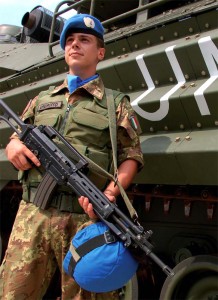 In the Western world, in particular, the old distrust remains alive and the US seems not to have decided yet whether China is a partner or a rival. However, some steps forward have been made in the reconciliation between Washington and Beijing. U.S. Secretary of Defense Leon Panetta, while visiting the PLA Engineering Academy of Armored Forces in Beijing, has declared that “China’s rise has brought millions out of poverty and helped to make the world a more prosperous place. I believe that it can also make the world a more secure place. If we work together – if we work together to build an enduring foundation for military-to-military relations between the United States and China, we can achieve greater prosperity and security in the Asia-Pacific region”.
In the Western world, in particular, the old distrust remains alive and the US seems not to have decided yet whether China is a partner or a rival. However, some steps forward have been made in the reconciliation between Washington and Beijing. U.S. Secretary of Defense Leon Panetta, while visiting the PLA Engineering Academy of Armored Forces in Beijing, has declared that “China’s rise has brought millions out of poverty and helped to make the world a more prosperous place. I believe that it can also make the world a more secure place. If we work together – if we work together to build an enduring foundation for military-to-military relations between the United States and China, we can achieve greater prosperity and security in the Asia-Pacific region”.
These are certainly important words that point towards a future of cooperation, but they need to be followed by real actions aimed to improve relationships with China and meant to recognize its international standing.
So far China has been underrepresented in the UN system that manage peace operations. For example, no Chinese representative was part of the international Panel, under the guide of Lakdar Brahimi, which the Secretary General appointed twelve years ago with the goal of reforming peace operations. Moreover, none of the headquarters of the seventeen UN specialized agencies is located in China, and no Chinese representative seats in the board of the Peace Operation Training Institute (POTI). This marginalization of China in peacekeeping institutions is not only totally unjustified in light of the contribution provided by Beijing, but it might have also negative consequences for the entire system of the United Nations. The tense relations that the West developed with Russia in the last decade should have taught that the international community has a deep interest in involving as much as possible in the management of world politics and global security rising powers like China.
Italian peacekeeping is instead a clear consequence of the engagement for peace written in the Italian constitution. We can say that the commitment for peacekeeping has always been an essential part of Italian foreign policy. The disputes and the diverging opinions have been mainly the consequence of internal political quarrels or have been motivated by financial constraints. It was clearly easier to take concrete steps in areas geographically close to Italy (as in the Mediterranean and Balkans countries) or in areas with special links with Italy (like Somalia and Mozambique), but we can state that Italian public opinion is naturally inclined to take part to the peacekeeping operation.
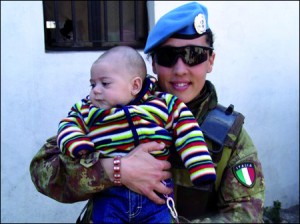 The first rule of Italian peacekeeping is to follow literally and faithfully the mandate and, therefore, not to be biased in favor of one side. The second rule is to engage the troops in an active and systematic help to the surrounding population. A great effort is therefore dedicated to medical assistance, to improve local infrastructures, to teach how to avoid to be wounded or killed by land mines.
The first rule of Italian peacekeeping is to follow literally and faithfully the mandate and, therefore, not to be biased in favor of one side. The second rule is to engage the troops in an active and systematic help to the surrounding population. A great effort is therefore dedicated to medical assistance, to improve local infrastructures, to teach how to avoid to be wounded or killed by land mines.
In addition a great effort has been dedicated (when possible) to buy services and goods by local population and to pay respect to local habits and opinions. This does not come by chance. A great effort is dedicated to select and train the peacekeepers. This has been facilitated by the long experience of Carabinieri, engaged both in the military and in the civilian engagement.
This long lasting experience has been extended both in Italy and abroad until the creation of Multinational Special Units dedicated to the improvement and the extension of the best practices in peacekeeping interventions.
The complexity of modern peacekeeping means, however, that no single state and no single organization is capable of dealing with the current challenges on its own. In order to achieve success, the international community as a whole should exploit the comparative advantages of its members and of the several international and regional organizations. More than ever, security threats require a common approach based on a variety of partnerships between the United Nations and regional institutions. In the troubled African environment, for example, the African Union and the Regional Economic Communities (RECs) have already played a key role in peace operations, which the international community should further support. Only by doing so, we can take the maximum advantage of the strengths of the different organizations and their member states.
Let me conclude, however, by reminding that either international or regional peacekeeping should not been seen as the optimal solution; peacekeeping is a policy of last resort and should remain so. The priority must be conflict prevention and conflict management to create a stable and secure environment. Because conflict can be avoided before it emerges, peace should not be pursued through the deployment of military force alone, but rather through diplomacy, effective governance, and social and economic development. Accordingly, China and Italy should continue not only to organize and participate in peacekeeping missions, but they should increase their support to development policies in the most troubled regions of the world.
Romano Prodi









